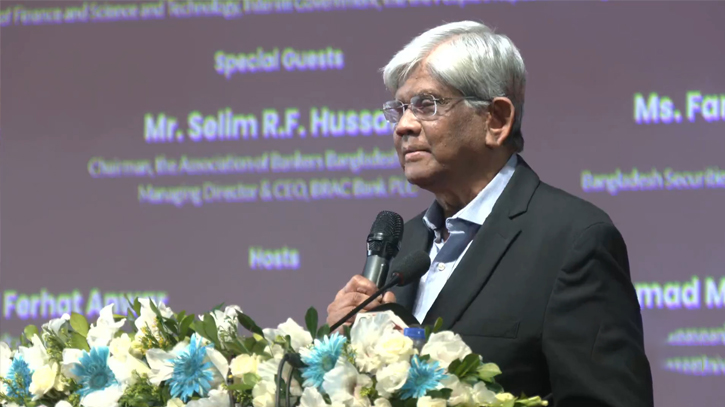
Photo: Collected
Finance Adviser to the interim government Dr Salehuddin Ahmed on SAturday (16 November) said that the government would be able to face the challenges surrounding it alongside dealing with internal and external factors to move forward the nation.
“We’re not in a financial crisis, rather facing some challenges –- political and economical –- alongside some internal and external factors like trade and financial system. We’ll be able to face those and we’ll do…” he said.
The Finance Adviser was addressing a "Policy Dialogue on Financial and Economic Reforms in Bangladesh" hosted by BRAC University at its Merul Badda Campus in the capital as the chief guest.
Dr. Debapriya Bhattacharya, Distinguished Fellow at the Centre for Policy Dialogue (CPD), and Farzana Lalarukh, Commissioner, Bangladesh Securities and Exchange Commission (BSEC) and Selim R.F Hussain, CEO and Managing Director of BRAC Bank PLC spoke at the dialogue as special guests.
BRAC University Vice-Chancellor Syed Ferhat Anwar made the concluding remarks while Acting Dean of BRAC Business School Dr Mohammad Mujibul Haque moderated the programme.
Speaking on the occasion, the Finance Adviser mentioned that the country experienced economic hard times during the 2007-08 periods, but that was tackled efficiently.
Turning to the issue of siphoning of money abroad especially during the previous regime, the Adviser said that it would take certain time to repatriate that amount.
“We’ want to give a message that none will be able to launder money abroad and the perpetrators will be nabbed…none will be able to siphon off money abroad from the private and public sector,” he added.
About the ongoing reforms in the financial and banking sector, he said that the interim government wants to leave a ‘footprint’ before the successive government so that they could follow such footprints and thus move forward.
Dr Salehuddin, also a former central bank Governor, said the government is immediately carrying out some short-term reforms in the financial sector, capital market and NBR while the long-term reforms would be carried out by the successive political government.
Referring to the various proactive steps in the banking sector, he said that discipline has been restored in such sector to some extent.
Noting that the development strategy of the country was wrong over the years as it was only ‘growth’, he said such strategy should have to be changed as only growth would not work.
Mentioning that none would be able to perceive the deep injury in the country’s financial sector occurred over the years from outside, the Adviser said, despite this, there is no reason to become frustrated as the creativity and the capacity of the country’s people is unparallel.
He urged all to supplement the government’s efforts to build a welfare-oriented state in a bid to tap the immense potentials.
Recalling the contributions of the students especially the students of BRAC University during the student-led mass uprising in July and August, Eminent economist Dr Debapriya Bhattacharya alleged that there were false figures regarding growth in the past regime.
He informed that the White Paper Committee, headed by him, has been working to determine what type of economy the interim government inherited from the previous AL regime, what were the problems in development trajectory, and the politicization of data and information.
He alleged that the private sector investment ratio to GDP remained around 23 percent for the last 10 years while the tax to GDP ratio also remained between 8 to 9 percent. Besides, there were illicit financial flow and inter-sectoral imbalance.
The noted economist said if the ‘oligarchs’ created over years could not be break down alongside their basic power base, then no reform would take place in the near future.
Dr Debapriya opined that if the interim government could not restore economic stability fully, then it would not be possible to move forward in the path of reforms.
BSEC Commissioner Farzana Lalarukh said that they want to be a facilitator rather than a regulator.
Citing that the BSEC is facing a big problem in dealing with the issue of lack of trust in the capital market, she said that the market watchdog, as part of its reform initiatives, has been working to restore trust and confidence in the capital market through working with transparency, accountability and digitalization.
BRAC Bank Managing Director and CEO Salim RF Hussain put emphasis on tax compliance, developing the capital market right at this moment through stringent regulatory reforms, fixing the regulatory loopholes to address the financial malpractice.
The event brought together prominent policymakers, financial leaders, industry experts, and academics for an in-depth exploration of critical reforms needed to strengthen Bangladesh's financial landscape.
Messenger/Fameema








